Evaluating the Building and Construction Security of Payment Act 1999
VerifiedAdded on 2023/06/04
|8
|2383
|380
Report
AI Summary
This report offers a detailed evaluation of the Building and Construction Industry Security of Payment Act 1999, focusing on its application in New South Wales, Australia. It begins by explaining the Act's operational mechanisms, emphasizing its role in ensuring timely payments within construction contracts. The report then delves into the objectives behind the Act's introduction, highlighting its purpose in safeguarding contractors' and subcontractors' financial entitlements and streamlining dispute resolution. Furthermore, it examines the Act's provisions concerning regular court actions, detailing how it governs payment claims, adjudication processes, and the roles of adjudicators. Finally, the report analyzes amendments specifically designed to protect subcontractors' rights, including provisions for payment retention and the ability to suspend work in cases of non-payment. The report concludes by summarizing the Act's impact on the construction industry and its effectiveness in promoting fair and prompt payment practices.

Building Law
Paraphrase This Document
Need a fresh take? Get an instant paraphrase of this document with our AI Paraphraser
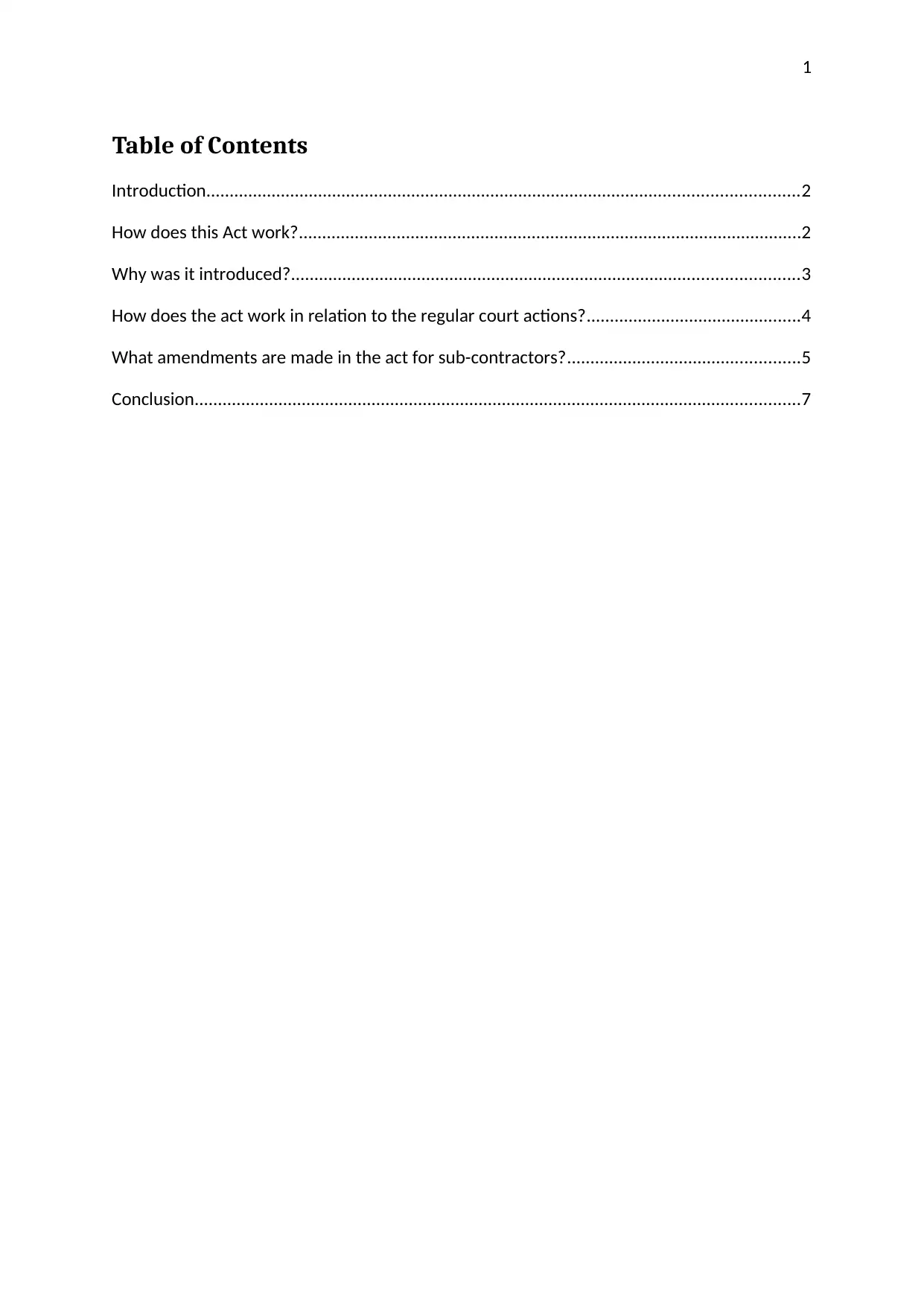
1
Table of Contents
Introduction...............................................................................................................................2
How does this Act work?............................................................................................................2
Why was it introduced?.............................................................................................................3
How does the act work in relation to the regular court actions?..............................................4
What amendments are made in the act for sub-contractors?..................................................5
Conclusion..................................................................................................................................7
Table of Contents
Introduction...............................................................................................................................2
How does this Act work?............................................................................................................2
Why was it introduced?.............................................................................................................3
How does the act work in relation to the regular court actions?..............................................4
What amendments are made in the act for sub-contractors?..................................................5
Conclusion..................................................................................................................................7
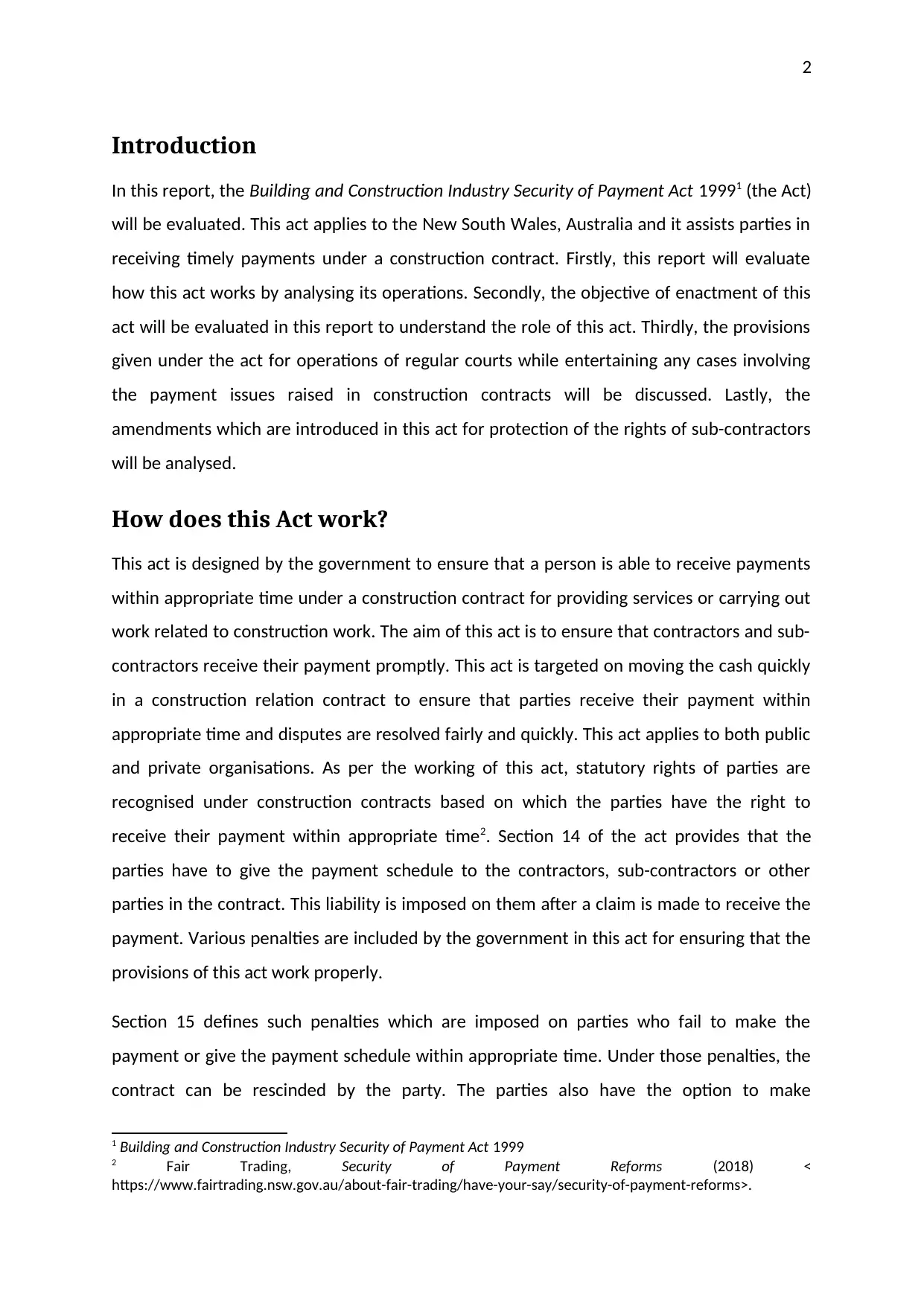
2
Introduction
In this report, the Building and Construction Industry Security of Payment Act 19991 (the Act)
will be evaluated. This act applies to the New South Wales, Australia and it assists parties in
receiving timely payments under a construction contract. Firstly, this report will evaluate
how this act works by analysing its operations. Secondly, the objective of enactment of this
act will be evaluated in this report to understand the role of this act. Thirdly, the provisions
given under the act for operations of regular courts while entertaining any cases involving
the payment issues raised in construction contracts will be discussed. Lastly, the
amendments which are introduced in this act for protection of the rights of sub-contractors
will be analysed.
How does this Act work?
This act is designed by the government to ensure that a person is able to receive payments
within appropriate time under a construction contract for providing services or carrying out
work related to construction work. The aim of this act is to ensure that contractors and sub-
contractors receive their payment promptly. This act is targeted on moving the cash quickly
in a construction relation contract to ensure that parties receive their payment within
appropriate time and disputes are resolved fairly and quickly. This act applies to both public
and private organisations. As per the working of this act, statutory rights of parties are
recognised under construction contracts based on which the parties have the right to
receive their payment within appropriate time2. Section 14 of the act provides that the
parties have to give the payment schedule to the contractors, sub-contractors or other
parties in the contract. This liability is imposed on them after a claim is made to receive the
payment. Various penalties are included by the government in this act for ensuring that the
provisions of this act work properly.
Section 15 defines such penalties which are imposed on parties who fail to make the
payment or give the payment schedule within appropriate time. Under those penalties, the
contract can be rescinded by the party. The parties also have the option to make
1 Building and Construction Industry Security of Payment Act 1999
2 Fair Trading, Security of Payment Reforms (2018) <
https://www.fairtrading.nsw.gov.au/about-fair-trading/have-your-say/security-of-payment-reforms>.
Introduction
In this report, the Building and Construction Industry Security of Payment Act 19991 (the Act)
will be evaluated. This act applies to the New South Wales, Australia and it assists parties in
receiving timely payments under a construction contract. Firstly, this report will evaluate
how this act works by analysing its operations. Secondly, the objective of enactment of this
act will be evaluated in this report to understand the role of this act. Thirdly, the provisions
given under the act for operations of regular courts while entertaining any cases involving
the payment issues raised in construction contracts will be discussed. Lastly, the
amendments which are introduced in this act for protection of the rights of sub-contractors
will be analysed.
How does this Act work?
This act is designed by the government to ensure that a person is able to receive payments
within appropriate time under a construction contract for providing services or carrying out
work related to construction work. The aim of this act is to ensure that contractors and sub-
contractors receive their payment promptly. This act is targeted on moving the cash quickly
in a construction relation contract to ensure that parties receive their payment within
appropriate time and disputes are resolved fairly and quickly. This act applies to both public
and private organisations. As per the working of this act, statutory rights of parties are
recognised under construction contracts based on which the parties have the right to
receive their payment within appropriate time2. Section 14 of the act provides that the
parties have to give the payment schedule to the contractors, sub-contractors or other
parties in the contract. This liability is imposed on them after a claim is made to receive the
payment. Various penalties are included by the government in this act for ensuring that the
provisions of this act work properly.
Section 15 defines such penalties which are imposed on parties who fail to make the
payment or give the payment schedule within appropriate time. Under those penalties, the
contract can be rescinded by the party. The parties also have the option to make
1 Building and Construction Industry Security of Payment Act 1999
2 Fair Trading, Security of Payment Reforms (2018) <
https://www.fairtrading.nsw.gov.au/about-fair-trading/have-your-say/security-of-payment-reforms>.
⊘ This is a preview!⊘
Do you want full access?
Subscribe today to unlock all pages.

Trusted by 1+ million students worldwide

3
adjudication appeal in the court. The parties also have the option to enforce the payment in
the contract. The operations of this act are further improved and strengthened by the
introduction of the Building and Construction Industry Security of Payment Amendment Bill
20183. There are many changes proposed by this bill in the act which are targeted on
ensuring that the payments of parties are made on due dates, and they are able to recover
their money without external assistance4. The working of this act is simple since the parties
did not have to appoint professionals such as lawyers to make a claim for their payment.
Thus, the operations of this act are focused on addressing the issue of non-payment or
delayed payment in construction contracts.
Why was it introduced?
Section 3 of the act provides the objective for which this act was introduced by the
government. The primary purpose of this act is to ensure that a person who is providing
services or carrying out construction work is able to recover the payments relating to such
work. The role of this act is to provide statutory entitlement to the parties under a
construction contract under which they can claim for the payment regardless of the fact
whether any provisions regarding the payments are included in the contract or not. The act
gives the right to the party to claim for the due payment. This act also provides provisions
for scheduling of the payment which is payable under the contract. The person also has the
right to refer their dispute to an adjudicator for determination. This act did not intend to
limit the right of parties under a construction contract or limit any other remedies which are
given to the party for recovering of their entitlement5. Moreover, the provisions regarding
sub-contractors are introduced in the act which is targeted on ensuring the claim that the
sub-contractor is able to receive the payment which is owed by a defaulting contractor.
An adjudication application can be made by a sub-contractor against a defaulting contractor
to recover the money. The liability of the contract continuous until the claim is withdrawn
by the sub-contractor and the principal contractor can withhold the payment until the claim
is withdrawn by the sub-contractor. In case the claim is successful, then a reasonable
3 Building and Construction Industry Security of Payment Amendment Bill 2018
4 Parliament, Building and Construction Industry Security of Payment Amendment Bill 2018 (2018) <
https://www.parliament.gov.sg/docs/default-source/default-document-library/building-and-construction-
industry-security-of-payment-(amendment)-bill-38-2018.pdf>.
5 Stuart Ross, ‘Security of payment legislation in Australia: issues with adjudication decisions’ (2013) 11 The
Journal of New Business Ideas & Trends 47.
adjudication appeal in the court. The parties also have the option to enforce the payment in
the contract. The operations of this act are further improved and strengthened by the
introduction of the Building and Construction Industry Security of Payment Amendment Bill
20183. There are many changes proposed by this bill in the act which are targeted on
ensuring that the payments of parties are made on due dates, and they are able to recover
their money without external assistance4. The working of this act is simple since the parties
did not have to appoint professionals such as lawyers to make a claim for their payment.
Thus, the operations of this act are focused on addressing the issue of non-payment or
delayed payment in construction contracts.
Why was it introduced?
Section 3 of the act provides the objective for which this act was introduced by the
government. The primary purpose of this act is to ensure that a person who is providing
services or carrying out construction work is able to recover the payments relating to such
work. The role of this act is to provide statutory entitlement to the parties under a
construction contract under which they can claim for the payment regardless of the fact
whether any provisions regarding the payments are included in the contract or not. The act
gives the right to the party to claim for the due payment. This act also provides provisions
for scheduling of the payment which is payable under the contract. The person also has the
right to refer their dispute to an adjudicator for determination. This act did not intend to
limit the right of parties under a construction contract or limit any other remedies which are
given to the party for recovering of their entitlement5. Moreover, the provisions regarding
sub-contractors are introduced in the act which is targeted on ensuring the claim that the
sub-contractor is able to receive the payment which is owed by a defaulting contractor.
An adjudication application can be made by a sub-contractor against a defaulting contractor
to recover the money. The liability of the contract continuous until the claim is withdrawn
by the sub-contractor and the principal contractor can withhold the payment until the claim
is withdrawn by the sub-contractor. In case the claim is successful, then a reasonable
3 Building and Construction Industry Security of Payment Amendment Bill 2018
4 Parliament, Building and Construction Industry Security of Payment Amendment Bill 2018 (2018) <
https://www.parliament.gov.sg/docs/default-source/default-document-library/building-and-construction-
industry-security-of-payment-(amendment)-bill-38-2018.pdf>.
5 Stuart Ross, ‘Security of payment legislation in Australia: issues with adjudication decisions’ (2013) 11 The
Journal of New Business Ideas & Trends 47.
Paraphrase This Document
Need a fresh take? Get an instant paraphrase of this document with our AI Paraphraser
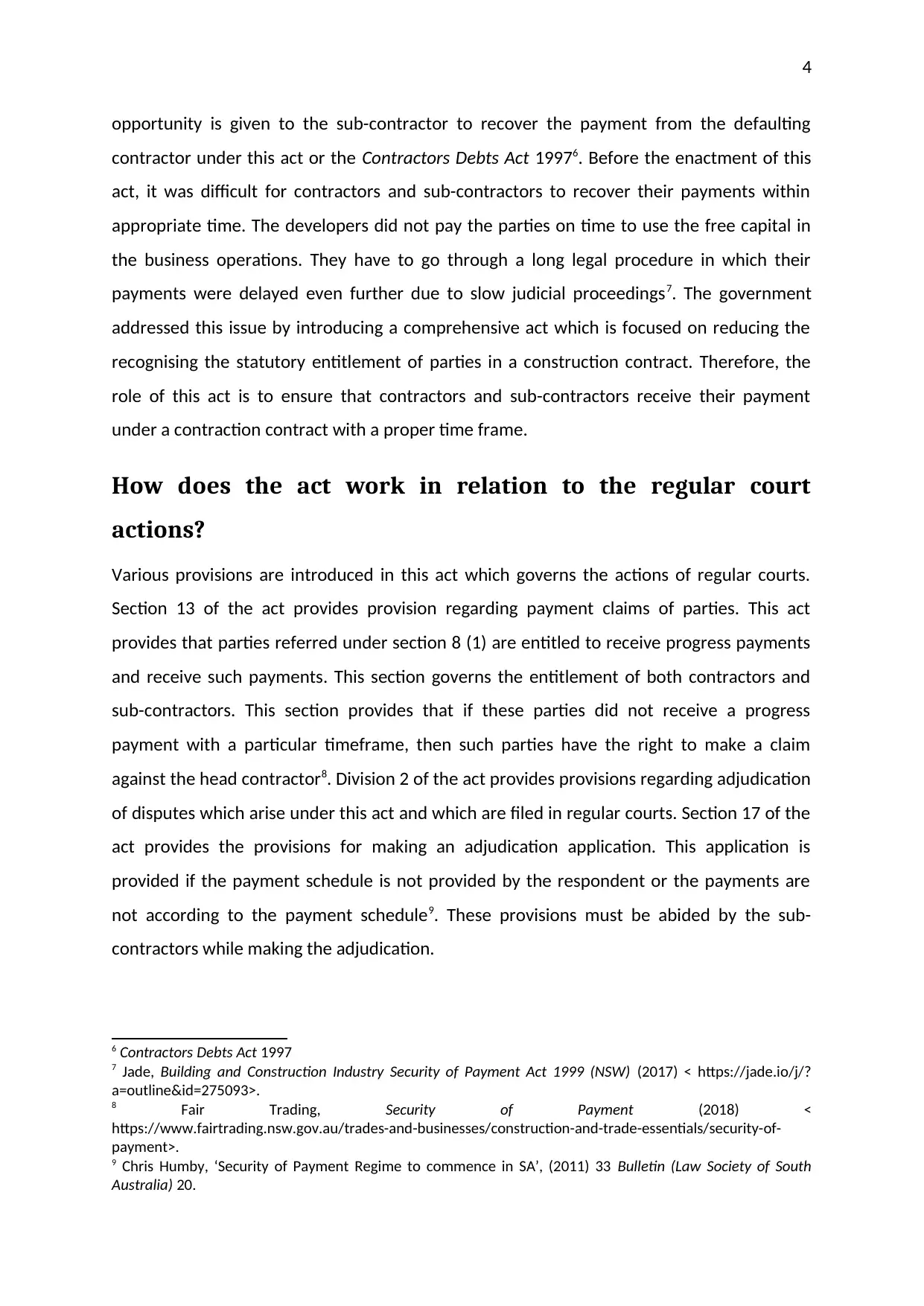
4
opportunity is given to the sub-contractor to recover the payment from the defaulting
contractor under this act or the Contractors Debts Act 19976. Before the enactment of this
act, it was difficult for contractors and sub-contractors to recover their payments within
appropriate time. The developers did not pay the parties on time to use the free capital in
the business operations. They have to go through a long legal procedure in which their
payments were delayed even further due to slow judicial proceedings7. The government
addressed this issue by introducing a comprehensive act which is focused on reducing the
recognising the statutory entitlement of parties in a construction contract. Therefore, the
role of this act is to ensure that contractors and sub-contractors receive their payment
under a contraction contract with a proper time frame.
How does the act work in relation to the regular court
actions?
Various provisions are introduced in this act which governs the actions of regular courts.
Section 13 of the act provides provision regarding payment claims of parties. This act
provides that parties referred under section 8 (1) are entitled to receive progress payments
and receive such payments. This section governs the entitlement of both contractors and
sub-contractors. This section provides that if these parties did not receive a progress
payment with a particular timeframe, then such parties have the right to make a claim
against the head contractor8. Division 2 of the act provides provisions regarding adjudication
of disputes which arise under this act and which are filed in regular courts. Section 17 of the
act provides the provisions for making an adjudication application. This application is
provided if the payment schedule is not provided by the respondent or the payments are
not according to the payment schedule9. These provisions must be abided by the sub-
contractors while making the adjudication.
6 Contractors Debts Act 1997
7 Jade, Building and Construction Industry Security of Payment Act 1999 (NSW) (2017) < https://jade.io/j/?
a=outline&id=275093>.
8 Fair Trading, Security of Payment (2018) <
https://www.fairtrading.nsw.gov.au/trades-and-businesses/construction-and-trade-essentials/security-of-
payment>.
9 Chris Humby, ‘Security of Payment Regime to commence in SA’, (2011) 33 Bulletin (Law Society of South
Australia) 20.
opportunity is given to the sub-contractor to recover the payment from the defaulting
contractor under this act or the Contractors Debts Act 19976. Before the enactment of this
act, it was difficult for contractors and sub-contractors to recover their payments within
appropriate time. The developers did not pay the parties on time to use the free capital in
the business operations. They have to go through a long legal procedure in which their
payments were delayed even further due to slow judicial proceedings7. The government
addressed this issue by introducing a comprehensive act which is focused on reducing the
recognising the statutory entitlement of parties in a construction contract. Therefore, the
role of this act is to ensure that contractors and sub-contractors receive their payment
under a contraction contract with a proper time frame.
How does the act work in relation to the regular court
actions?
Various provisions are introduced in this act which governs the actions of regular courts.
Section 13 of the act provides provision regarding payment claims of parties. This act
provides that parties referred under section 8 (1) are entitled to receive progress payments
and receive such payments. This section governs the entitlement of both contractors and
sub-contractors. This section provides that if these parties did not receive a progress
payment with a particular timeframe, then such parties have the right to make a claim
against the head contractor8. Division 2 of the act provides provisions regarding adjudication
of disputes which arise under this act and which are filed in regular courts. Section 17 of the
act provides the provisions for making an adjudication application. This application is
provided if the payment schedule is not provided by the respondent or the payments are
not according to the payment schedule9. These provisions must be abided by the sub-
contractors while making the adjudication.
6 Contractors Debts Act 1997
7 Jade, Building and Construction Industry Security of Payment Act 1999 (NSW) (2017) < https://jade.io/j/?
a=outline&id=275093>.
8 Fair Trading, Security of Payment (2018) <
https://www.fairtrading.nsw.gov.au/trades-and-businesses/construction-and-trade-essentials/security-of-
payment>.
9 Chris Humby, ‘Security of Payment Regime to commence in SA’, (2011) 33 Bulletin (Law Society of South
Australia) 20.
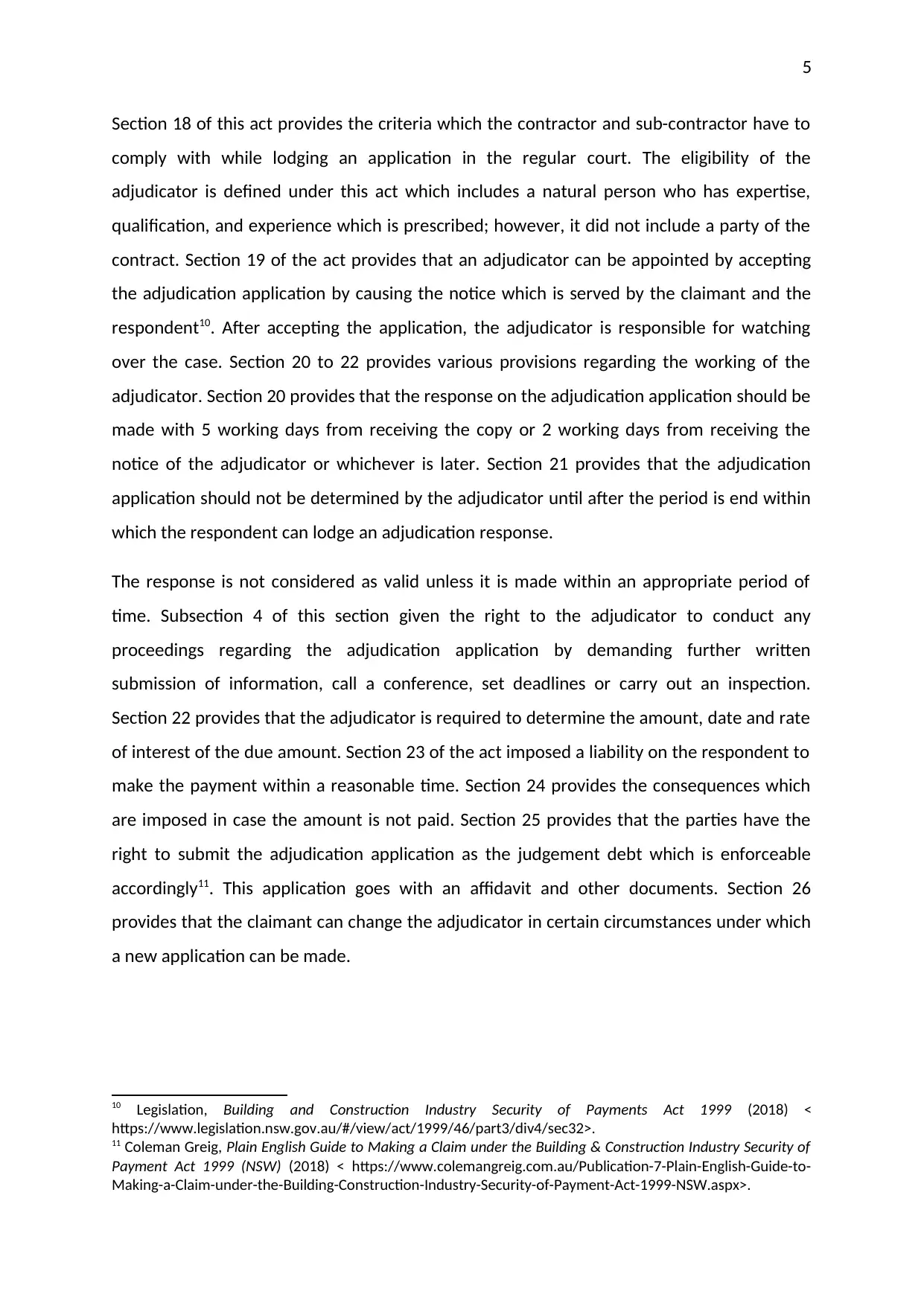
5
Section 18 of this act provides the criteria which the contractor and sub-contractor have to
comply with while lodging an application in the regular court. The eligibility of the
adjudicator is defined under this act which includes a natural person who has expertise,
qualification, and experience which is prescribed; however, it did not include a party of the
contract. Section 19 of the act provides that an adjudicator can be appointed by accepting
the adjudication application by causing the notice which is served by the claimant and the
respondent10. After accepting the application, the adjudicator is responsible for watching
over the case. Section 20 to 22 provides various provisions regarding the working of the
adjudicator. Section 20 provides that the response on the adjudication application should be
made with 5 working days from receiving the copy or 2 working days from receiving the
notice of the adjudicator or whichever is later. Section 21 provides that the adjudication
application should not be determined by the adjudicator until after the period is end within
which the respondent can lodge an adjudication response.
The response is not considered as valid unless it is made within an appropriate period of
time. Subsection 4 of this section given the right to the adjudicator to conduct any
proceedings regarding the adjudication application by demanding further written
submission of information, call a conference, set deadlines or carry out an inspection.
Section 22 provides that the adjudicator is required to determine the amount, date and rate
of interest of the due amount. Section 23 of the act imposed a liability on the respondent to
make the payment within a reasonable time. Section 24 provides the consequences which
are imposed in case the amount is not paid. Section 25 provides that the parties have the
right to submit the adjudication application as the judgement debt which is enforceable
accordingly11. This application goes with an affidavit and other documents. Section 26
provides that the claimant can change the adjudicator in certain circumstances under which
a new application can be made.
10 Legislation, Building and Construction Industry Security of Payments Act 1999 (2018) <
https://www.legislation.nsw.gov.au/#/view/act/1999/46/part3/div4/sec32>.
11 Coleman Greig, Plain English Guide to Making a Claim under the Building & Construction Industry Security of
Payment Act 1999 (NSW) (2018) < https://www.colemangreig.com.au/Publication-7-Plain-English-Guide-to-
Making-a-Claim-under-the-Building-Construction-Industry-Security-of-Payment-Act-1999-NSW.aspx>.
Section 18 of this act provides the criteria which the contractor and sub-contractor have to
comply with while lodging an application in the regular court. The eligibility of the
adjudicator is defined under this act which includes a natural person who has expertise,
qualification, and experience which is prescribed; however, it did not include a party of the
contract. Section 19 of the act provides that an adjudicator can be appointed by accepting
the adjudication application by causing the notice which is served by the claimant and the
respondent10. After accepting the application, the adjudicator is responsible for watching
over the case. Section 20 to 22 provides various provisions regarding the working of the
adjudicator. Section 20 provides that the response on the adjudication application should be
made with 5 working days from receiving the copy or 2 working days from receiving the
notice of the adjudicator or whichever is later. Section 21 provides that the adjudication
application should not be determined by the adjudicator until after the period is end within
which the respondent can lodge an adjudication response.
The response is not considered as valid unless it is made within an appropriate period of
time. Subsection 4 of this section given the right to the adjudicator to conduct any
proceedings regarding the adjudication application by demanding further written
submission of information, call a conference, set deadlines or carry out an inspection.
Section 22 provides that the adjudicator is required to determine the amount, date and rate
of interest of the due amount. Section 23 of the act imposed a liability on the respondent to
make the payment within a reasonable time. Section 24 provides the consequences which
are imposed in case the amount is not paid. Section 25 provides that the parties have the
right to submit the adjudication application as the judgement debt which is enforceable
accordingly11. This application goes with an affidavit and other documents. Section 26
provides that the claimant can change the adjudicator in certain circumstances under which
a new application can be made.
10 Legislation, Building and Construction Industry Security of Payments Act 1999 (2018) <
https://www.legislation.nsw.gov.au/#/view/act/1999/46/part3/div4/sec32>.
11 Coleman Greig, Plain English Guide to Making a Claim under the Building & Construction Industry Security of
Payment Act 1999 (NSW) (2018) < https://www.colemangreig.com.au/Publication-7-Plain-English-Guide-to-
Making-a-Claim-under-the-Building-Construction-Industry-Security-of-Payment-Act-1999-NSW.aspx>.
⊘ This is a preview!⊘
Do you want full access?
Subscribe today to unlock all pages.

Trusted by 1+ million students worldwide
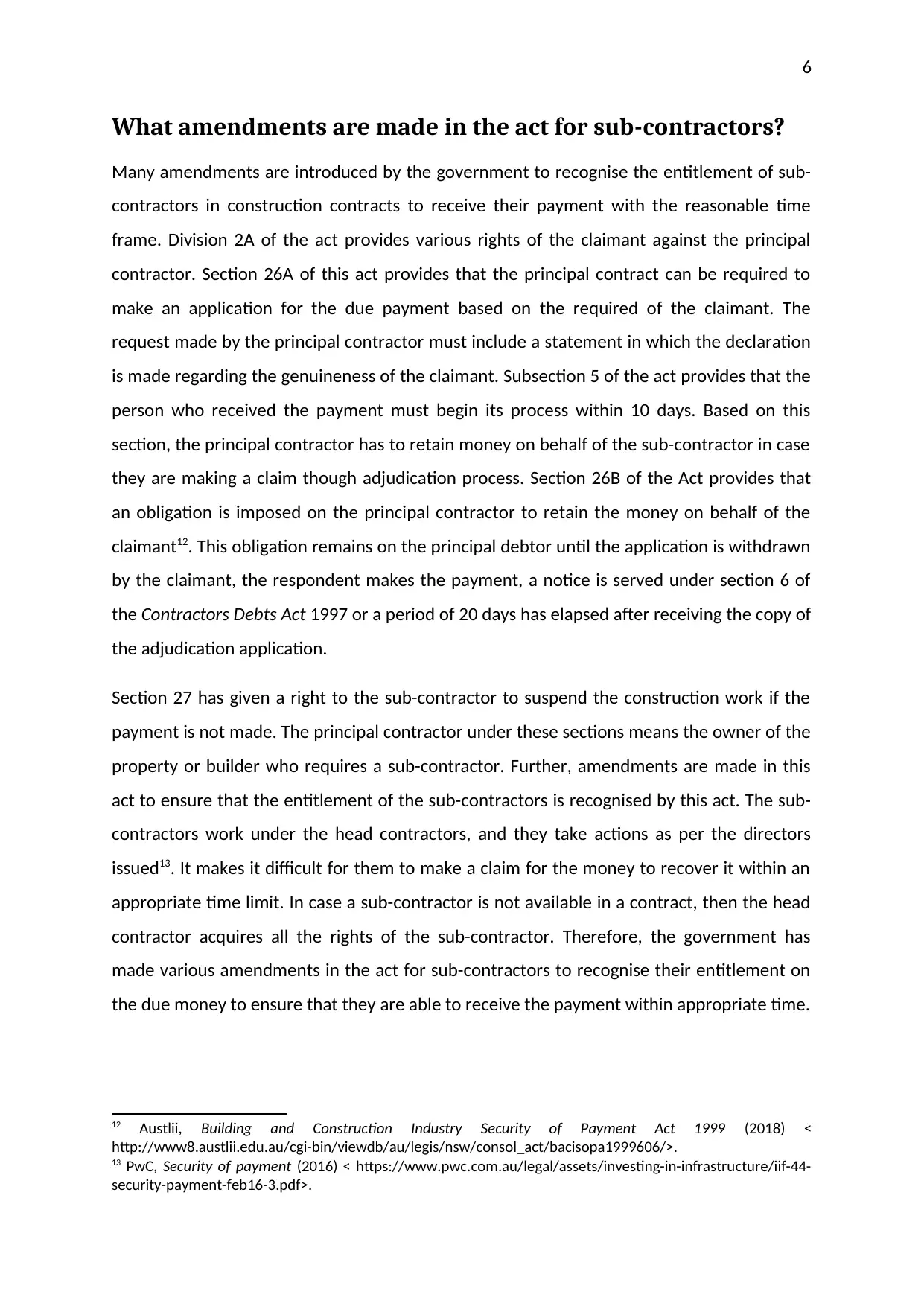
6
What amendments are made in the act for sub-contractors?
Many amendments are introduced by the government to recognise the entitlement of sub-
contractors in construction contracts to receive their payment with the reasonable time
frame. Division 2A of the act provides various rights of the claimant against the principal
contractor. Section 26A of this act provides that the principal contract can be required to
make an application for the due payment based on the required of the claimant. The
request made by the principal contractor must include a statement in which the declaration
is made regarding the genuineness of the claimant. Subsection 5 of the act provides that the
person who received the payment must begin its process within 10 days. Based on this
section, the principal contractor has to retain money on behalf of the sub-contractor in case
they are making a claim though adjudication process. Section 26B of the Act provides that
an obligation is imposed on the principal contractor to retain the money on behalf of the
claimant12. This obligation remains on the principal debtor until the application is withdrawn
by the claimant, the respondent makes the payment, a notice is served under section 6 of
the Contractors Debts Act 1997 or a period of 20 days has elapsed after receiving the copy of
the adjudication application.
Section 27 has given a right to the sub-contractor to suspend the construction work if the
payment is not made. The principal contractor under these sections means the owner of the
property or builder who requires a sub-contractor. Further, amendments are made in this
act to ensure that the entitlement of the sub-contractors is recognised by this act. The sub-
contractors work under the head contractors, and they take actions as per the directors
issued13. It makes it difficult for them to make a claim for the money to recover it within an
appropriate time limit. In case a sub-contractor is not available in a contract, then the head
contractor acquires all the rights of the sub-contractor. Therefore, the government has
made various amendments in the act for sub-contractors to recognise their entitlement on
the due money to ensure that they are able to receive the payment within appropriate time.
12 Austlii, Building and Construction Industry Security of Payment Act 1999 (2018) <
http://www8.austlii.edu.au/cgi-bin/viewdb/au/legis/nsw/consol_act/bacisopa1999606/>.
13 PwC, Security of payment (2016) < https://www.pwc.com.au/legal/assets/investing-in-infrastructure/iif-44-
security-payment-feb16-3.pdf>.
What amendments are made in the act for sub-contractors?
Many amendments are introduced by the government to recognise the entitlement of sub-
contractors in construction contracts to receive their payment with the reasonable time
frame. Division 2A of the act provides various rights of the claimant against the principal
contractor. Section 26A of this act provides that the principal contract can be required to
make an application for the due payment based on the required of the claimant. The
request made by the principal contractor must include a statement in which the declaration
is made regarding the genuineness of the claimant. Subsection 5 of the act provides that the
person who received the payment must begin its process within 10 days. Based on this
section, the principal contractor has to retain money on behalf of the sub-contractor in case
they are making a claim though adjudication process. Section 26B of the Act provides that
an obligation is imposed on the principal contractor to retain the money on behalf of the
claimant12. This obligation remains on the principal debtor until the application is withdrawn
by the claimant, the respondent makes the payment, a notice is served under section 6 of
the Contractors Debts Act 1997 or a period of 20 days has elapsed after receiving the copy of
the adjudication application.
Section 27 has given a right to the sub-contractor to suspend the construction work if the
payment is not made. The principal contractor under these sections means the owner of the
property or builder who requires a sub-contractor. Further, amendments are made in this
act to ensure that the entitlement of the sub-contractors is recognised by this act. The sub-
contractors work under the head contractors, and they take actions as per the directors
issued13. It makes it difficult for them to make a claim for the money to recover it within an
appropriate time limit. In case a sub-contractor is not available in a contract, then the head
contractor acquires all the rights of the sub-contractor. Therefore, the government has
made various amendments in the act for sub-contractors to recognise their entitlement on
the due money to ensure that they are able to receive the payment within appropriate time.
12 Austlii, Building and Construction Industry Security of Payment Act 1999 (2018) <
http://www8.austlii.edu.au/cgi-bin/viewdb/au/legis/nsw/consol_act/bacisopa1999606/>.
13 PwC, Security of payment (2016) < https://www.pwc.com.au/legal/assets/investing-in-infrastructure/iif-44-
security-payment-feb16-3.pdf>.
Paraphrase This Document
Need a fresh take? Get an instant paraphrase of this document with our AI Paraphraser
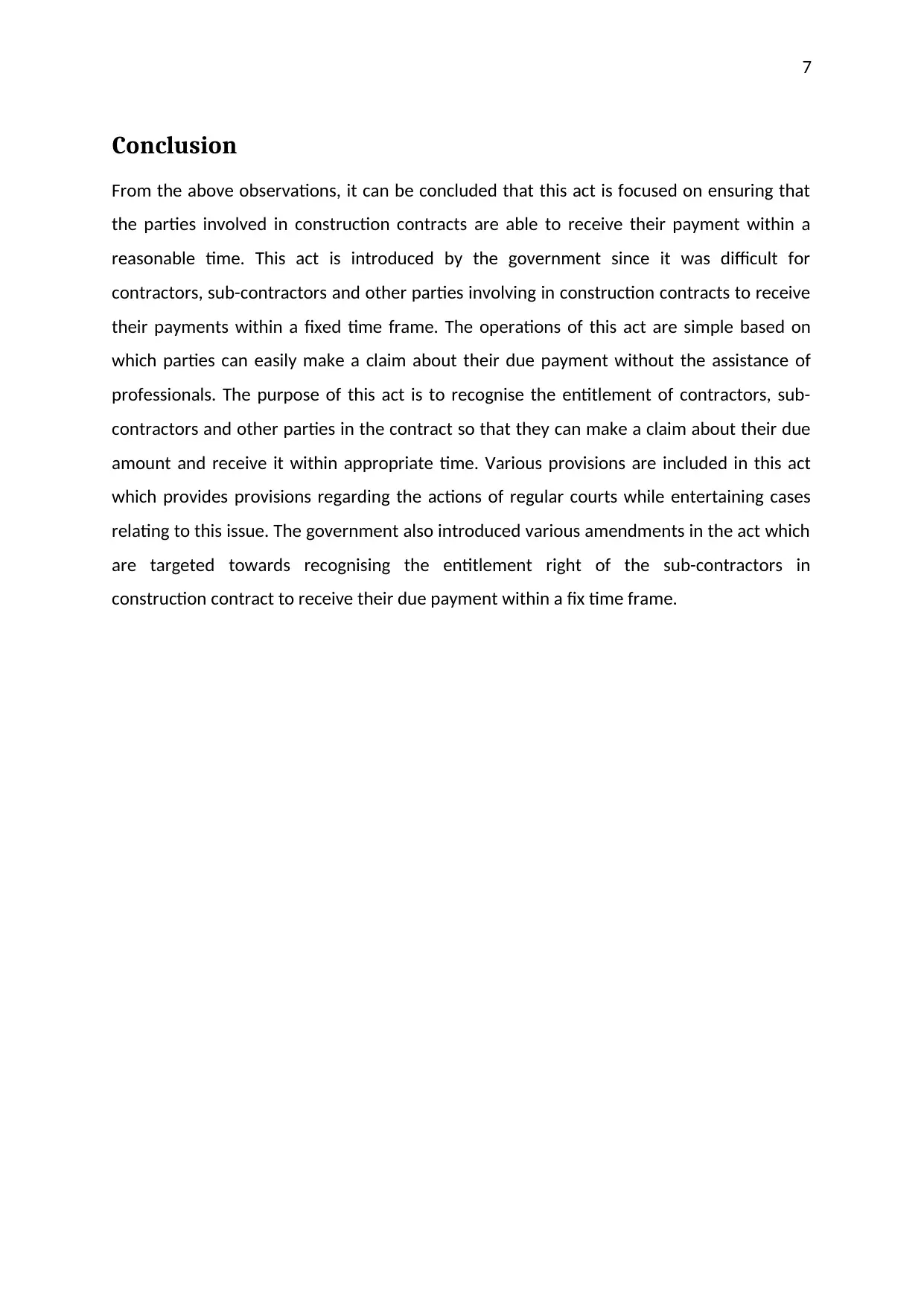
7
Conclusion
From the above observations, it can be concluded that this act is focused on ensuring that
the parties involved in construction contracts are able to receive their payment within a
reasonable time. This act is introduced by the government since it was difficult for
contractors, sub-contractors and other parties involving in construction contracts to receive
their payments within a fixed time frame. The operations of this act are simple based on
which parties can easily make a claim about their due payment without the assistance of
professionals. The purpose of this act is to recognise the entitlement of contractors, sub-
contractors and other parties in the contract so that they can make a claim about their due
amount and receive it within appropriate time. Various provisions are included in this act
which provides provisions regarding the actions of regular courts while entertaining cases
relating to this issue. The government also introduced various amendments in the act which
are targeted towards recognising the entitlement right of the sub-contractors in
construction contract to receive their due payment within a fix time frame.
Conclusion
From the above observations, it can be concluded that this act is focused on ensuring that
the parties involved in construction contracts are able to receive their payment within a
reasonable time. This act is introduced by the government since it was difficult for
contractors, sub-contractors and other parties involving in construction contracts to receive
their payments within a fixed time frame. The operations of this act are simple based on
which parties can easily make a claim about their due payment without the assistance of
professionals. The purpose of this act is to recognise the entitlement of contractors, sub-
contractors and other parties in the contract so that they can make a claim about their due
amount and receive it within appropriate time. Various provisions are included in this act
which provides provisions regarding the actions of regular courts while entertaining cases
relating to this issue. The government also introduced various amendments in the act which
are targeted towards recognising the entitlement right of the sub-contractors in
construction contract to receive their due payment within a fix time frame.
1 out of 8
Related Documents
Your All-in-One AI-Powered Toolkit for Academic Success.
+13062052269
info@desklib.com
Available 24*7 on WhatsApp / Email
![[object Object]](/_next/static/media/star-bottom.7253800d.svg)
Unlock your academic potential
Copyright © 2020–2026 A2Z Services. All Rights Reserved. Developed and managed by ZUCOL.



